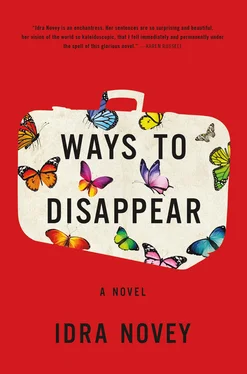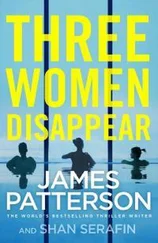She lowered her head as well and forced herself to focus on the words, though she knew them. Yit’gadal, v’yitkadash, she murmured along in Hebrew with the elderly relatives who had arrived early and taken up the entire front row. Raquel had refused to ask any of these older aunts and uncles for the ransom money, but she’d invited them to the funeral, and all of them had come, pulling Raquel and Marcus into their arms like children. Once these elderly aunts and uncles were assembled in the front row, it felt right for them to be there, their gravelly voices forming a chorus for the mourner’s prayer.
Emma didn’t understand why Raquel’s loud and hairy boss had also filed into the front row. The relatives she understood — they were the ones who would eventually lie next to Beatriz and her parents and brother, here in the Jewish communal section of Cemitério do Cajú. If only they had called them earlier.
If Beatriz had gone to them for money instead of Flamenguinho.
If the brother Beatriz had spoken of visiting in this cemetery hadn’t died at seventeen. If he’d known her as only a sibling can after so many years.
If Emma had known her at all.
If she’d asked better questions.
If she’d asked fewer.
If she’d sat, just once, with Beatriz on the balcony without getting so nervous she had to string a new curtain of literary inquiries between them.
If everyone will please turn to page one hundred and ten.
To page one twenty-three.
If you will please give your attention to Raquel, who has chosen a passage from—

If you are familiar with my mother’s second novel, you may know this scene. It appears just after the mayors die and the butterflies begin to arrive with duller wings.
For years, Raquel began to read, they came in bright abundance, forming clouds over the riverbank. Tourists would arrive by the boatload to behold them in all their orange and pink-tipped magnificence. But then one mayor was undone in his own bed, the other chopped to pieces, and when the butterflies arrived it was not quite as before. First the orange of their wings deepened to a glistening black. Then the pink along the edges reddened to a muddy brown. They began to arrive in ever more colorless clouds and the tourists would not have it. They called them moths and left bewildered.
Only the locals, she read on, continued to call them butterflies, to hold out their arms for them to flutter against their skin. As for the darkening of their wings, along the Amazon they called it the ink blue of the eyes of infants, of the river at six in the evening in the mist after a monsoon.
Raquel paused to steady her hands so the page would stop trembling. But she had waited a beat too long. She’d lost her place on the page. As she searched for where she’d stopped, it occurred to her how many seconds like this were to come, her mother gone and nowhere left to look for her except in a fog of sentences like this one.
In the mist after a monsoon, Raquel repeated, looking out at the crowd that had come to mourn her mother, all of them watching her, waiting for her to read on. Only when her gaze stopped at the second row did she realize who she was looking for, the one person who would know the degree to which her hands had begun to tremble, and also the next words she needed. Emma mouthed the phrase where Raquel had left off and finding it, Raquel continued, reading well past where she’d originally planned to stop, to show that she could. Then she read on, even further, until it was no longer about anyone at the funeral or even about her mother. It was only about the sentences, her breath matching the give-and-take of the cadence, the rhythm filling her chest, and for the first time in days she did not feel empty.
By the time she sat down next to Marcus, she was breathless. Several aunts leaned over to murmur about how beautifully she’d read and she thanked them, her face wet, until Marcus took her hand and she let herself collapse a little against his shoulder, though there was not much of him to collapse against. He’d become so bony. Beneath his suit, his chest was sunken like a ship, and leaning into him, Raquel could not remember why it had felt so necessary for her brother to be equally alone.
Up at the podium, the rabbi who none of them knew reached the end of the final prayer and the dam gave way. The whole river of mourners began to surge toward them. Raquel told Marcus that they would drown if they didn’t head directly to the black sedans Rocha had rented for the procession.
Unless, she said, there’s someone you want to ask to ride with us.
Marcus hung his head and said he could think of only one person. I’ll ask her, Raquel offered. Just go to the car. We’ll meet you there.

The semester began. The stacks of syllabi. A student arrived with his T-shirt on inside out. Another walked in chewing gum with her mouth open and with such vigor it required every muscle in her face.
Only this semester the heat stayed and stayed. The leaves remained on the trees.
After her fifth class, Emma found a small yellow lizard crawling into her coffee cup. The next week, her office door jammed from the humidity and she got stuck inside, knocking on her own door until a passing colleague yanked the knob and freed her. The next morning the rusted knob fell off in her hand.
At the Pontifical Catholic University of Rio de Janeiro, there was little that Emma could predict with any consistency. In that regard, it did not feel at odds with the rest of her life. Her parents kept telling her it wasn’t enough, that she couldn’t live this way in her thirties, on her own in a dangerous country, teaching for so little money she had to rent a room from some musicologist named Esmeralda.
However, Emma only stayed at Esmeralda’s when she was writing. Other nights she stayed with Marcus or they took a bus up the coast. At the present moment, for example, they were sitting in some prongs of palm shade studying an older woman who was not the right size or shape to be Beatriz but who was writing in the sand with her toe, stepping closer to the water with each word. As they watched, the waves began to foam around the woman’s ankles yet she kept on composing, wading in and in, her words beginning to dissolve as she wrote them. Surely she would be reasonable and stop when the water met her knees.
And if she didn’t? If she kept going?
Already, the bathers on the beach had begun to look around, to wonder who would be the first to get up and approach her, and with what question. As for those who remained under their umbrellas, might this stranger come to haunt them anyway? Might they wake in the night and discover foam around their ankles, to find that they were entering the ocean with this unknown woman in their sleep?
IDRA NOVEY is the author of Exit, Civilian, selected for the 2011 National Poetry Series. Her most recent translation is Clarice Lispector’s novel The Passion According to G.H. Born in western Pennsylvania, she has lived in Chile, Brazil, and New York. This is her first novel.













